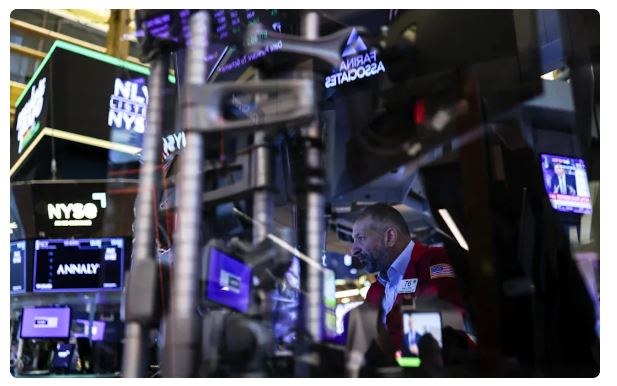Publisher: Maaal International Media Company
License: 465734
Trump-fuelled debt crisis pushes investors to Britain
اقرأ المزيد
The world’s biggest money managers are piling into British bonds as Donald Trump’s trade war sparks a crisis of confidence in the US, The Telegraph reported .
BlackRock, Vanguard and Standard Life owner Phoenix Group, which together manage $20 trillion of funds, bought billions of pounds worth of gilts over the past few days after snubbing US government debt.
BlackRock said British government debt now appeared “attractive” compared to US Treasuries, as Mr Trump’s tariffs put the world’s largest economy’s safe haven status at risk.
Simon Blundell, a fund manager who co-manages a $90bn bond portfolio at BlackRock, said: “We have been buying gilts on the platform this week.
“If we start seeing investors around the globe look to diversify their ‘safe haven’ allocations away from the US to any degree, we feel gilts and other European sovereign markets could be the beneficiary.”
Other large investors are also stepping away from US government debt in favour of European bonds such as German Bunds.
Vanguard, which has more than $10 trillion of assets under management, said it had also increased its holdings of UK debt, including long-dated gilts.
It has done so even as other investors sold off their holdings last week to send yields to their highest level since 1998. This was triggered by turmoil across global debt markets.
At one point, US 30-year yields were on track for their largest weekly rise since 1982, before yields fell back on Friday.
The vote of confidence in gilts from some of the world’s biggest money managers will be welcomed by Rachel Reeves, who could be forced to raise taxes again this Autumn if the trade war tips the global economy into recession.
The UK is paying £100bn a year in debt interest, meaning even small moves in borrowing costs can add billions to the Chancellor’s debt servicing costs.
Ales Koutny, of Vanguard, said its bond traders were adding to holdings in countries with trade deficits with the US, which are set to be more insulated from further tariff shocks.
“We have seen very strong flows towards fixed income, and a meaningful part of that has been into our UK-focused funds,” said Koutny. “As active managers, we believe that there is a right price for everything.”
He added that the US president’s tariff onslaught, including levies of 145pc on imports from China, had inflicted permanent damage on America’s economy.
That is despite a climbdown, when Mr Trump bowed to market pressure by pausing higher tariffs on most countries.
Mr Koutny said: “We do expect some pain to remain, and we do think some damage has been done. Going forward, other metrics are showing the bond markets are now requiring a little bit of extra compensation to deal with the volatility and uncertainty that we have seen.”
America, which has seen its public debt soar to $36 trillion, would be paying the price for years to come, he added, warning that a premium on US borrowing would quickly add up.
“We’re talking about hundreds of billions or even trillions of dollars, even for a few basis points here and there,” said Mr Koutny.
By contrast, Vanguard believes the UK offers an opportunity for investors, as Mr Koutny praised the Bank of England’s decision last week to delay an auction of long-term debt.
He added that a move by the Debt Management Office (DMO) to shift away from long-term gilts in the Spring Statement showed policymakers were listening to investors’ needs.
British asset manager Insight, which manages £626.2bn, also said it had been buying “attractive” gilts, while selling off Treasuries “to reduce risk”.
Harry Richards, of Jupiter Asset Management, who co-manages £6bn of multi-sector fixed income investments, said it had cashed in after Mr Trump’s initial tariff blitz by selling some longer-dated US government debt when yields fell and prices rose.
He added that the UK’s weakening growth outlook meant they “continue to see an opportunity here, albeit the path to lower yields is likely to be volatile”.
Phoenix Group, Britain’s biggest long-term savings group, said it had also bought gilts this week.
Mike Eakins, chief investment officer of the FTSE 100 firm, said: “With geopolitical tensions brimming at the minute it is clear this is a new phase for the bond markets”, adding the company was investing in a “prudent manner”.
However, others warned that the Liz Truss mini-budget still loomed large in investors’ minds.
Alex Everett, a fund manager at Aberdeen Investments, said: “I would say that after the mini-Budget stress, investors have been much more shy [sic] about expressing long-term structural views in the UK, and whenever we see a global episode of stress, the UK has been on the forefront of the liquidations.”
He added that he was pivoting his portfolio towards German debt, despite the government’s commitment to spend hundreds of billions of euros on defence and infrastructure.
Mr Everett said: “We’ve been shown very clearly by what Trump has been doing that the role of the US as a safe haven is no longer as clear, and to be frank, that the US is less keen to cement its place in that position.
“And so that means that when the market is fearful, we’ve been turning to Bunds, which despite the supply increase offers a much higher degree of stability.”









